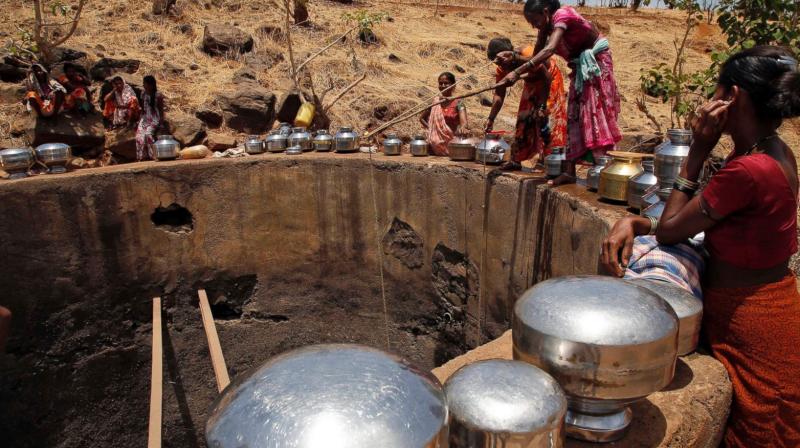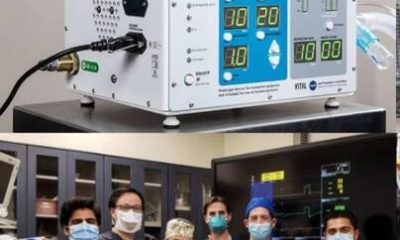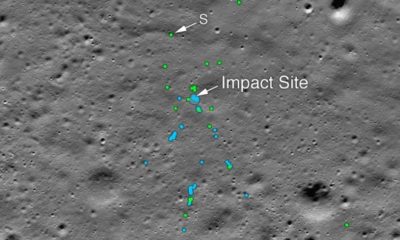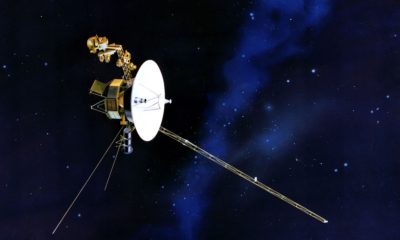National
NASA study warns of freshwater decline in India

Availability of freshwater has declined in the northern and eastern parts of India, says a new study that combined an array of NASA satellite observations of Earth with data on human activities to map locations where freshwater is changing around the globe.
The study, published in the journal Nature, found that Earth’s wetland areas are getting wetter and dry areas are getting drier due to a variety of factors, including human water management, climate change and natural cycles.

Areas in northern and eastern India, the Middle East, California and Australia are among the hotspots where overuse of water resources has caused a serious decline in the availability of freshwater, and without corrective actions by the governments to preserve water, the situation is likely to worsen in these areas, the Guardian reported this week citing the study.
The first-of-its-kind study used 14 years of observations from the US/German-led Gravity Recovery and Climate Experiment (GRACE) spacecraft mission to track global trends in freshwater in 34 regions around the world.
“This is the first time that we’ve used observations from multiple satellites in a thorough assessment of how freshwater availability is changing, everywhere on Earth,” said Matt Rodell of NASA’s Goddard Space Flight Center in Greenbelt, Maryland,

“A key goal was to distinguish shifts in terrestrial water storage caused by natural variability – wet periods and dry periods associated with El Nino and La Nina, for example – from trends related to climate change or human impacts, like pumping groundwater out of an aquifer faster than it is replenished,” Rodell added.
Freshwater is found in lakes, rivers, soil, snow, groundwater and ice. Freshwater loss from the ice sheets at the poles – attributed to climate change – has implications for sea level rise.
On land, freshwater is one of the most essential of Earth’s resources, for drinking water and agriculture.
The researchers found that while some regions’ water supplies are relatively stable, others experienced increases or decreases.
“What we are witnessing is major hydrologic change,” said co-author Jay Famiglietti of NASA’s Jet Propulsion Laboratory (JPL) in Pasadena, California.
“We see a distinctive pattern of the wet land areas of the world getting wetter – those are the high latitudes and the tropics – and the dry areas in between getting dryer. Embedded within the dry areas we see multiple hotspots resulting from groundwater depletion,” Famiglietti warned.

Famiglietti noted that while water loss in some regions, like the melting ice sheets and alpine glaciers, is clearly driven by warming climate, it will require more time and data to determine the driving forces behind other patterns of freshwater change.
However, the GRACE satellite observations alone couldn’t tell the researchers what was causing the apparent trends.
“We examined information on precipitation, agriculture and groundwater pumping to find a possible explanation for the trends estimated from GRACE,” said co-author Hiroko Beaudoing of Goddard and the University of Maryland in College Park.
National
Foodman Vishal Singh Honored for Hunger Free World Mission in Bangkok

Lucknow: Vishal Singh, a renowned social worker from Lucknow, also known as Foodman, has once again made India proud. He was honored by the Happy Hands Gloves Cooperative Limited Company in Korathai, Thailand, for his work with the Hunger Free World Mission.
The Hunger Free World Mission’s meeting was held in Korathai, Thailand, under Vishal Singh’s leadership. Representatives from several countries, including Mr. Raja Dwivedi (Managing Director of Happy Hands Gloves Limited), Thailand Coordinator Mr. Raja Mishra, and member Mr. Varun Singh, attended the event.

Under Vishal Singh’s leadership, the attendees took a pledge to work together toward creating a hunger-free world.
Speaking on the occasion, Vishal Singh explained that the main goal of the Hunger Free World Mission is social participation. He said the mission is not just about feeding people but also about meeting other basic needs of those who are struggling. The mission focuses on helping families of terminally ill patients in hospitals by providing food and shelter. It also works to fulfill essential needs like education, jobs, and care for the elderly.
For the last 16 years, the Vijay Sri Foundation has been providing free services, benefiting thousands of people. Vishal Singh highlighted that the mission aims to gain global recognition like other organizations such as WHO, WWF, and Red Cross, which work for social causes.
During this meeting, Vishal Singh was appointed as the Chairman of the Hunger Free World Mission by representatives from various countries. They also discussed holding regular meetings in different countries to push the mission forward.
Business tycoon Dr. Abhishek Verma has also supported this humanitarian mission, vowing to promote the idea of “Seva Parmo Dharma” (Service is the highest duty) worldwide. Vishal Singh praised him, stating that people like Dr .Abhishek Verma inspire others to work for the betterment of society.
Recently, Romania’s Ambassador, Mr . Daniela Sezonov Ţane, invited Vishal Singh to the Romanian Embassy in Delhi, where they discussed the mission in detail. Impressed by his humanitarian work, she honored Vishal Singh and invited him to Romania to take the mission forward .
Food man Vishal Singh has been serving the people of India for the past 16 years. Through the Vijay Sri Foundation, he provides free meals to cancer patients & their families ,shelter, and education for women & children along with running free old-age homes in Lucknow.
In addition to his humanitarian work, Vishal Singh also addresses issues like crime and corruption through his role as Chairman of Seva Path Media and Managing Director of Vijay Sri Foundation.

During the COVID-19 pandemic, Vishal Singh and his team worked tirelessly to provide food and help to the needy, including starving children, elderly citizens, and pregnant women. Despite contracting the virus himself, he continued to assist others after his recovery. He even created a life-saving oxygen regulator using household items, which was praised by doctors both in India and abroad.
In his address at the meeting, Vishal Singh spoke about his mission to create a hunger-free world. He pointed out that India’s large population, along with issues like unemployment and poverty, has caused the country to fall on the Hunger Index. He urged people to contribute just one handful of grains daily to help create a hunger-free world.
He concluded by saying that through social participation, we can empower the people around us, meet their basic needs, and work together to build a stronger, more prosperous, and developed society.























